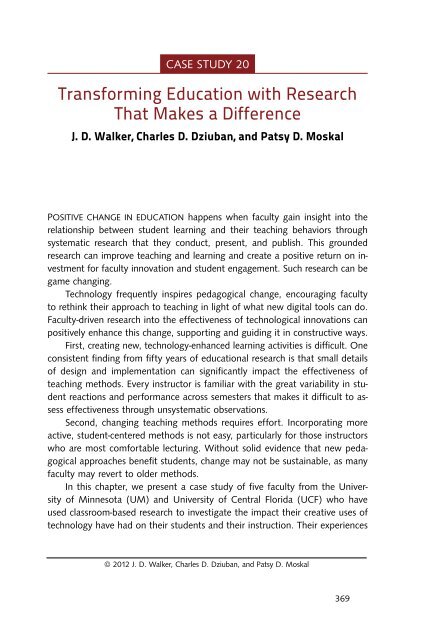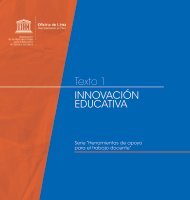- Page 1:
Game Changers Education and Informa
- Page 4 and 5:
Game Changers
- Page 6 and 7:
Game Changers: Education and Inform
- Page 9 and 10:
Contents Foreword Molly Corbett Bro
- Page 11 and 12:
Game Changers: Education and IT Cas
- Page 13 and 14:
Foreword Among the many strengths o
- Page 15:
Game Changers
- Page 18 and 19:
Game Changers: Education and IT Uni
- Page 20 and 21:
Game Changers: Education and IT pat
- Page 23 and 24:
1 The Knowledge Economy: Challenges
- Page 25 and 26:
The Knowledge Economy The Imperativ
- Page 27 and 28:
The Knowledge Economy Figure 2. Col
- Page 29 and 30:
The Knowledge Economy These problem
- Page 31 and 32:
The Knowledge Economy and for maint
- Page 33 and 34:
The Knowledge Economy always adequa
- Page 35 and 36:
The Knowledge Economy assembling a
- Page 37:
The Knowledge Economy about questio
- Page 40 and 41:
Game Changers: Education and IT pat
- Page 42 and 43:
Game Changers: Education and IT Fig
- Page 44 and 45:
Game Changers: Education and IT how
- Page 46 and 47:
Game Changers: Education and IT and
- Page 48 and 49:
Game Changers: Education and IT Tho
- Page 50 and 51:
Game Changers: Education and IT 10.
- Page 52 and 53:
Game Changers: Education and IT all
- Page 54 and 55:
Game Changers: Education and IT Tod
- Page 56 and 57:
Game Changers: Education and IT Col
- Page 58 and 59:
Game Changers: Education and IT sha
- Page 60 and 61:
Game Changers: Education and IT the
- Page 62 and 63:
Game Changers: Education and IT the
- Page 64 and 65:
Game Changers: Education and IT for
- Page 67 and 68:
4 From Metrics to Analytics, Report
- Page 69 and 70:
Metrics to Analytics, Reporting to
- Page 71 and 72:
Metrics to Analytics, Reporting to
- Page 73 and 74:
Metrics to Analytics, Reporting to
- Page 75 and 76:
Metrics to Analytics, Reporting to
- Page 77 and 78:
Metrics to Analytics, Reporting to
- Page 79:
Metrics to Analytics, Reporting to
- Page 82 and 83:
Game Changers: Education and IT tha
- Page 84 and 85:
Game Changers: Education and IT on
- Page 86 and 87:
Game Changers: Education and IT Fig
- Page 88 and 89:
Game Changers: Education and IT tel
- Page 90 and 91:
Game Changers: Education and IT Onl
- Page 92 and 93:
Game Changers: Education and IT lea
- Page 94 and 95:
Game Changers: Education and IT Not
- Page 96 and 97:
Game Changers: Education and IT cap
- Page 98 and 99:
Game Changers: Education and IT Buy
- Page 100 and 101:
Game Changers: Education and IT jou
- Page 102 and 103:
Game Changers: Education and IT cri
- Page 105 and 106:
7 Early Days of a Growing Trend: No
- Page 107 and 108:
Public-Private Partnerships is extr
- Page 109 and 110:
Public-Private Partnerships Trends
- Page 111 and 112:
Public-Private Partnerships Figure
- Page 113 and 114:
Public-Private Partnerships capital
- Page 115 and 116:
Public-Private Partnerships through
- Page 117 and 118:
Public-Private Partnerships be serv
- Page 119 and 120:
8 Scaling Up: Four Ideas to Increas
- Page 121 and 122:
Four Ideas to Increase College Comp
- Page 123 and 124:
Four Ideas to Increase College Comp
- Page 125 and 126:
Four Ideas to Increase College Comp
- Page 127:
Four Ideas to Increase College Comp
- Page 130 and 131:
Game Changers: Education and IT •
- Page 132 and 133:
Game Changers: Education and IT Tec
- Page 134 and 135:
Game Changers: Education and IT not
- Page 136 and 137:
Game Changers: Education and IT for
- Page 138 and 139:
Game Changers: Education and IT Del
- Page 140 and 141:
Game Changers: Education and IT inc
- Page 142 and 143:
Game Changers: Education and IT The
- Page 144 and 145:
Game Changers: Education and IT WGU
- Page 146 and 147:
Game Changers: Education and IT Con
- Page 148 and 149:
Game Changers: Education and IT an
- Page 150 and 151:
Game Changers: Education and IT Tec
- Page 152 and 153:
Game Changers: Education and IT and
- Page 154 and 155:
Game Changers: Education and IT out
- Page 156 and 157:
Game Changers: Education and IT the
- Page 158 and 159:
Game Changers: Education and IT wil
- Page 160 and 161:
Game Changers: Education and IT and
- Page 162 and 163:
Game Changers: Education and IT pol
- Page 164 and 165:
Game Changers: Education and IT Loo
- Page 166 and 167:
Game Changers: Education and IT for
- Page 168 and 169:
Game Changers: Education and IT lea
- Page 170 and 171:
Game Changers: Education and IT Not
- Page 173 and 174:
12 Athabasca University: Canada’s
- Page 175 and 176:
Athabasca University challenges, th
- Page 177 and 178:
Athabasca University new technologi
- Page 179 and 180:
Athabasca University facilitate imp
- Page 181 and 182:
Athabasca University expectations.
- Page 183 and 184:
Athabasca University Table 1. Athab
- Page 185 and 186:
Athabasca University Becoming a Twe
- Page 187 and 188:
Athabasca University Learning Desig
- Page 189 and 190:
13 Providing Quality Higher Educati
- Page 191 and 192:
UMUC Figure 1. Ideal Learning Envir
- Page 193 and 194:
UMUC They also reported that studen
- Page 195 and 196:
UMUC Figure 3. SEGUE Program Design
- Page 197 and 198:
UMUC effective teaching and learnin
- Page 199:
UMUC results, we will compare learn
- Page 202 and 203:
Game Changers: Education and IT the
- Page 204 and 205:
Game Changers: Education and IT inf
- Page 206 and 207:
Game Changers: Education and IT of
- Page 208 and 209:
Game Changers: Education and IT ins
- Page 210 and 211:
Game Changers: Education and IT UoP
- Page 212 and 213:
Game Changers: Education and IT any
- Page 215 and 216:
15 The Open Learning Initiative: En
- Page 217 and 218:
The Open Learning Initiative Proble
- Page 219 and 220:
The Open Learning Initiative Figure
- Page 221 and 222:
The Open Learning Initiative Figure
- Page 223 and 224:
The Open Learning Initiative In the
- Page 225 and 226:
The Open Learning Initiative in cre
- Page 227:
The Open Learning Initiative 4. K.
- Page 230 and 231:
Game Changers: Education and IT Int
- Page 232 and 233:
Game Changers: Education and IT Tab
- Page 234 and 235:
Game Changers: Education and IT uni
- Page 236 and 237:
Game Changers: Education and IT Tab
- Page 238 and 239:
Game Changers: Education and IT Tab
- Page 240 and 241:
Game Changers: Education and IT req
- Page 242 and 243:
Game Changers: Education and IT 9.
- Page 244 and 245:
Game Changers: Education and IT int
- Page 246 and 247:
Game Changers: Education and IT Fac
- Page 248 and 249:
Game Changers: Education and IT mor
- Page 250 and 251:
Game Changers: Education and IT 1.
- Page 252 and 253:
Game Changers: Education and IT 1.
- Page 254 and 255:
Game Changers: Education and IT III
- Page 256 and 257:
Game Changers: Education and IT 2.
- Page 258 and 259:
Game Changers: Education and IT ser
- Page 260 and 261:
Game Changers: Education and IT Fig
- Page 262 and 263:
Game Changers: Education and IT Fig
- Page 264 and 265:
Game Changers: Education and IT Sch
- Page 267:
Case Studies
- Page 270 and 271:
Game Changers: Education and IT Rat
- Page 272 and 273:
Game Changers: Education and IT mem
- Page 274 and 275:
Game Changers: Education and IT Thi
- Page 276 and 277:
Game Changers: Education and IT the
- Page 278 and 279:
Game Changers: Education and IT Deg
- Page 280 and 281:
Game Changers: Education and IT bet
- Page 283 and 284:
Case STUDY 4 Yakima Valley Communit
- Page 285 and 286:
Case Study: Yakima Valley Community
- Page 287:
Case Study: Yakima Valley Community
- Page 290 and 291:
Game Changers: Education and IT bet
- Page 292 and 293:
Game Changers: Education and IT fur
- Page 294 and 295:
Game Changers: Education and IT of
- Page 296 and 297:
Game Changers: Education and IT pil
- Page 298 and 299:
Game Changers: Education and IT Eri
- Page 300 and 301:
Game Changers: Education and IT •
- Page 302 and 303:
Game Changers: Education and IT Fig
- Page 305 and 306:
Case STUDY 8 OpenCourseWare Mary Lo
- Page 307 and 308:
Case Study: OpenCourseWare Figure 1
- Page 309 and 310:
Case Study: OpenCourseWare offered
- Page 311 and 312:
Case Study: OpenCourseWare of NetEa
- Page 313:
Case Study: OpenCourseWare 4. For e
- Page 316 and 317:
Game Changers: Education and IT abo
- Page 318 and 319:
Game Changers: Education and IT App
- Page 320 and 321:
Game Changers: Education and IT The
- Page 322 and 323:
Game Changers: Education and IT ins
- Page 324 and 325:
Game Changers: Education and IT Alt
- Page 326 and 327:
Game Changers: Education and IT and
- Page 328 and 329:
Game Changers: Education and IT Rec
- Page 330 and 331:
Game Changers: Education and IT The
- Page 332 and 333: Game Changers: Education and IT Stu
- Page 334 and 335: Game Changers: Education and IT 4.
- Page 336 and 337: Game Changers: Education and IT I r
- Page 338 and 339: Game Changers: Education and IT sur
- Page 341 and 342: Case STUDY 13 Blended Learning and
- Page 343 and 344: Case Study: Blended Learning in Nor
- Page 345 and 346: Case STUDY 14 Valencia College: Lif
- Page 347 and 348: Case Study: Valencia College source
- Page 349: Case Study: Valencia College Joyce
- Page 352 and 353: Game Changers: Education and IT ass
- Page 354 and 355: Game Changers: Education and IT I a
- Page 356 and 357: Game Changers: Education and IT Our
- Page 358 and 359: Game Changers: Education and IT and
- Page 360 and 361: Game Changers: Education and IT cou
- Page 363 and 364: case study 17 Stories in Our Classr
- Page 365 and 366: Case Study: Faculty Community of Pr
- Page 367: Case Study: Faculty Community of Pr
- Page 370 and 371: Game Changers: Education and IT mem
- Page 372 and 373: Game Changers: Education and IT was
- Page 375 and 376: Case STUDY 19 CS50 at Harvard: “T
- Page 377 and 378: Case Study: CS50 at Harvard It is t
- Page 379 and 380: Case Study: CS50 at Harvard prizes
- Page 381: Case Study: CS50 at Harvard 5. Davi
- Page 385 and 386: Case Study: Transforming Education
- Page 387 and 388: case study 21 Shaping the Path to D
- Page 389 and 390: Case Study: Indiana University eTex
- Page 391 and 392: Case Study: Indiana University eTex
- Page 393 and 394: Case Study: Indiana University eTex
- Page 395 and 396: Index 2CUL, 43-44 2tor, 94, 231, 23
- Page 397 and 398: Index Course Teaching Guides (CTGs)
- Page 399 and 400: Index Liberal Education and America
- Page 401 and 402: Index SUNY Empire State College, 14



